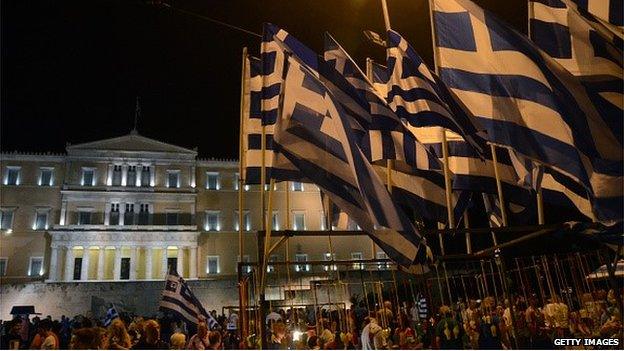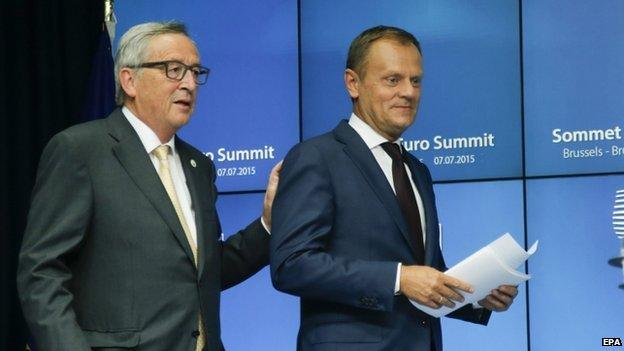Tusk: Greece crisis most critical moment in EU history
- Published
- comments

As I said on the News at Ten tonight, I am not often shocked, but I was tonight by the bleak assessment of the state of Greece rescue talks made by Donald Tusk, the current president of the European Council.
He said that there is now, for the first time, a real deadline - the end of this week - for Greece to come up with a practical proposal for staying in the euro.
The alternative, Mr Tusk said, was bankruptcy of the Greek state and the insolvency of its banks - heaping penury on its 12 million people.
He described the decision confronting Greece and the rest of the eurozone as the most important in the history of the currency union and the wider EU.

Donald Tusk, right, has given a bleak warning
The other European president, Jean-Claude Juncker - president of the European Commission, the EU's top bureaucrat - made clear this was not grandstanding or a bluff by government heads: a detailed plan for how Greece would exit the euro had been worked out, he said.
And it is significant that the final decision will be made at the weekend, when markets are closed.
What also seems particularly significant is that Mr Tusk has called an emergency meeting not only of eurozone government heads for Sunday, but also of the full EU - because exit of Greece from the euro would have a negative economic and political impact on all EU countries.
So will Alexis Tsipras be able to come up with a plan to reform and strengthen his economy that the rest of the eurozone will accept?
In public, his representatives are optimistic. In private however members of his government are gloomy.
And even if the worst is somehow avoided at one minute before midnight on Sunday, terrible economic damage is being wreaked on Greece right now - by the near collapse of its banks.
There is a risk that that damage will get worse on Thursday. Because bankers tell me that, even with customers only allowed to withdraw up to €60 a day per account at the moment, Greek banks are almost out of cash.
In the absence of any practical rescue plan for Greece, they do not expect the European Central Bank to turn the tap of emergency lending back on tomorrow night.
So they are braced to suffer even more severe capital controls, with daily permissible withdrawals falling to perhaps as little as €20 a day - which would not go far for a family of four.
Or to put it another way, even if a robust bailout plan is suddenly magicked up, there is no magicking away that the uncertainty of the past weeks and months has bulldozed away Greece's too fragile recovery.